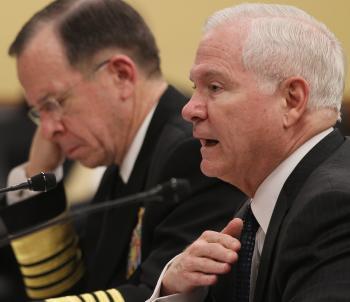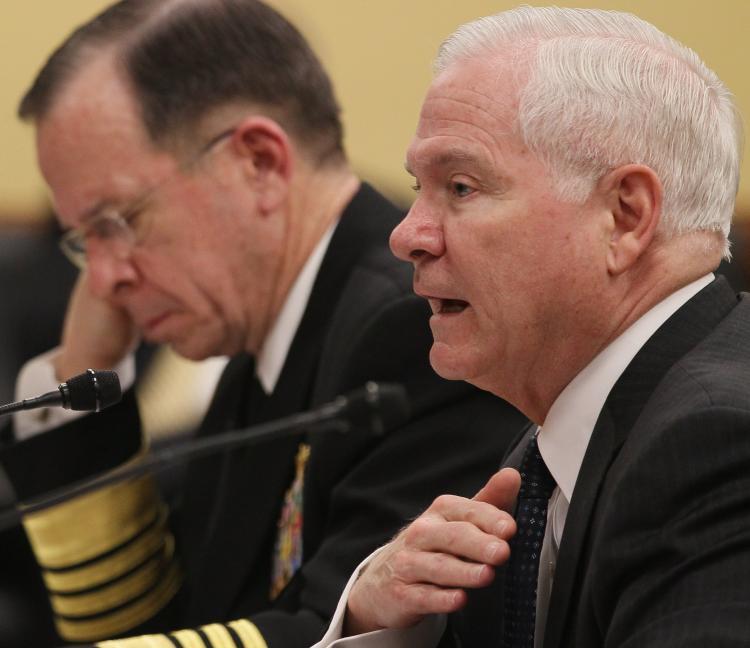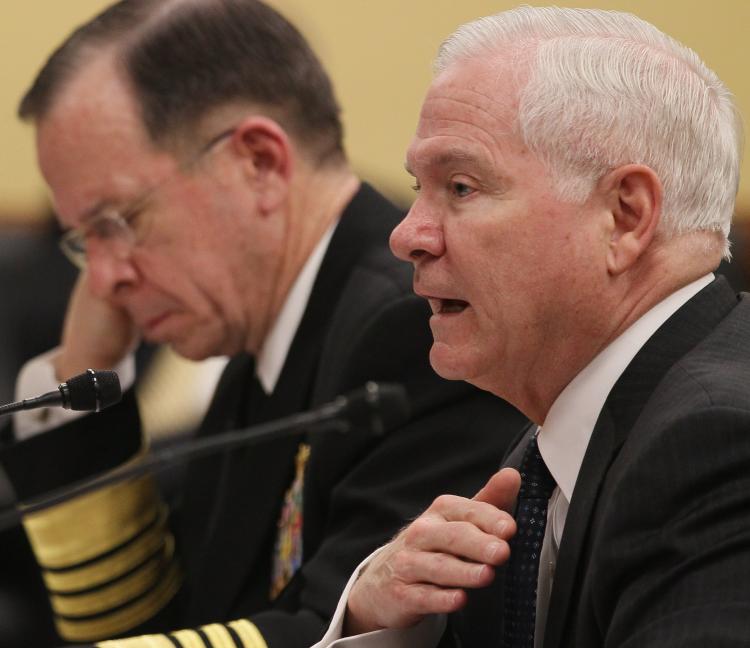WASHINGTON—To get a departmental budget approved, its top brass must first face the jury in the relevant congressional committees, and answer tough questions from members of the committee.
Tuesday, Secretary of Defense Robert Gates, and Chairman of the Joint Chiefs of Staff Adm. Michael Mullen faced the crucial House Appropriations Committee, where they defended their department’s request for $553 billion in core funding, and an additional $117.8 billion to directly fund the country’s war effort.
While the military leaders met with “friendly fire” for the most part, they were asked by members of Congress to clarify the country’s direction in Afghanistan and Pakistan, and explain the loss of billions in wasted procurement spending. Other topics, like the prevalence of contract forces, and the lack of jobs for returning veterans, also came up.
Secretary Gates reiterated that his department would face a “crisis situation” if it were forced to continue operating under a continuing resolution, which is effectively $23 billion less than what was requested in the 2011 budget.
It would significantly damage procurement and research programs, force reduced maintenance and grounding of part of the aircraft fleet, delay facilities improvements, and cut training and readiness, Secretary Gates said.
“It is an exponential inefficiency over time,” said Adm. Mullen.
The Defense Department’s budget is projected to flatline over the next five years, ending a stretch of modest increases.
Savings through efficiencies and troop reductions are planned, while rising health care costs are consuming an increasingly large share of the budget, growing from $19 billion in 2001 to $52.5 billion for 2012.
A new Global Security Contingency Fund is proposed as a way for the department to coordinate better with the State Department on civilian support for overseas operations.
The fund is to be seeded with $50 million from the State Department’s budget and supplemented with a request for congressional authorization to transfer $450 million from the Defense Department’s budget if needed.
Both Secretary Gates and Adm. Mullen emphasized advances over the last two years in training the Afghan army, claiming that progress on recruiting and training over the last year has been extraordinary.
Marksmanship has improved from 35 to 95 percent, army troops have attained a grade 1 level of education, and military leaders are at a grade 3 level, reported Adm. Mullen, emphasizing that this has offered them a level of confidence and competence that they did not have a year ago.
Adm. Mullen, who was in the region last week, said he witnessed a level of coordination and trust between U.S. Gen. David Petraeus, the coalition’s commander in Afghanistan, and Pakistan’s army chief, Gen. Asfaq Kyani, that was not there a year ago. Al-Qaeda is in much worse shape that it was one to two years ago.
Secretary Gates said the United States only really started fighting the war in Iraq over the last two years. He said that after decisively winning the war between 2001–2001, the United States took its eye off the ball while the Taliban regrouped and returned, and levels of violence grew. The troop surge in 2009 was when the United States really got into the fight, Secretary Gates said.
“We finally got the resources right, we finally got the people right, we have the strategy right, and we are starting to turn,” said Adm. Mullen.
Both Secretary Gates and Adm. Mullen said the United States must get the job done in Afghanistan and Pakistan; to abandon the war would be a risk to the world and to our national security, they both maintained.
Despite clarity about the necessity of the mission, the Defense chiefs admitted being unclear about how to complete it.
The American objective still needs to be defined, and Secretary Gates said he has spent a lot of time discussing with the administration a proper exit strategy for the region.
For now, Secretary Gates said that he has made it clear to Afghan leaders that the United States will not sustain the same level of commitment (currently at $12 billion) for longer than two to three more years.
Next: Procurement Reform
In his response to the Defense chiefs’ opening remarks, Commissioner of the Appropriations Committee, Bill Young (R-Fla.), said he has repeatedly expressed his “strong concern” about wasted Defense Department spending.
“[S]tarting a program, stopping programs, paying termination fees, investing billions of dollars, canceling the program ... and we get nothing for it. The taxpayer gets nothing for it,” he said.
Concerns over the department’s infamous procurement kerfuffles were echoed by Ken Calvert (R-Calif.). “How can DOD and Congress help change the trend in these multiyear, multibillion dollar acquisitions, which in some cases end up with very little product, and in some cases, serious cost overruns?” he asked.
Secretary Gates welcomed the question and responded, “When dollars were flowing as much as they were in the past decade, I think there was a temptation to go after the most exquisite possible, most technologically advanced possible kinds of capabilities, often using unproven technologies.”
“In terms of requirements, we were not disciplined enough in the operational use of something,” he added.
To get the problem under control, in April 2009, Secretary Gates said he curtailed or canceled 23 programs that, if built to completion, would have cost $300 billion.
He said he scaled back requirements, and salvaged new technologies, engineering and design, where possible. He fired the head of the failed joint fighter strike program, and said he has taken steps to professionalize the acquisitions workforce to make it a valid Army career.
Just last week, a 10-year procurement process ended with a $35 billion dollar award to Boeing to replace the military’s aging KC-135 Air Force tanker fleet. The new planes, which will be called KC-46A, will produce at least 50,000 American jobs.
Tuesday, Secretary of Defense Robert Gates, and Chairman of the Joint Chiefs of Staff Adm. Michael Mullen faced the crucial House Appropriations Committee, where they defended their department’s request for $553 billion in core funding, and an additional $117.8 billion to directly fund the country’s war effort.
While the military leaders met with “friendly fire” for the most part, they were asked by members of Congress to clarify the country’s direction in Afghanistan and Pakistan, and explain the loss of billions in wasted procurement spending. Other topics, like the prevalence of contract forces, and the lack of jobs for returning veterans, also came up.
Secretary Gates reiterated that his department would face a “crisis situation” if it were forced to continue operating under a continuing resolution, which is effectively $23 billion less than what was requested in the 2011 budget.
It would significantly damage procurement and research programs, force reduced maintenance and grounding of part of the aircraft fleet, delay facilities improvements, and cut training and readiness, Secretary Gates said.
“It is an exponential inefficiency over time,” said Adm. Mullen.
The Defense Department’s budget is projected to flatline over the next five years, ending a stretch of modest increases.
Savings through efficiencies and troop reductions are planned, while rising health care costs are consuming an increasingly large share of the budget, growing from $19 billion in 2001 to $52.5 billion for 2012.
A new Global Security Contingency Fund is proposed as a way for the department to coordinate better with the State Department on civilian support for overseas operations.
The fund is to be seeded with $50 million from the State Department’s budget and supplemented with a request for congressional authorization to transfer $450 million from the Defense Department’s budget if needed.
Afghanistan and Pakistan
Both Secretary Gates and Adm. Mullen emphasized advances over the last two years in training the Afghan army, claiming that progress on recruiting and training over the last year has been extraordinary.
Marksmanship has improved from 35 to 95 percent, army troops have attained a grade 1 level of education, and military leaders are at a grade 3 level, reported Adm. Mullen, emphasizing that this has offered them a level of confidence and competence that they did not have a year ago.
Adm. Mullen, who was in the region last week, said he witnessed a level of coordination and trust between U.S. Gen. David Petraeus, the coalition’s commander in Afghanistan, and Pakistan’s army chief, Gen. Asfaq Kyani, that was not there a year ago. Al-Qaeda is in much worse shape that it was one to two years ago.
Secretary Gates said the United States only really started fighting the war in Iraq over the last two years. He said that after decisively winning the war between 2001–2001, the United States took its eye off the ball while the Taliban regrouped and returned, and levels of violence grew. The troop surge in 2009 was when the United States really got into the fight, Secretary Gates said.
“We finally got the resources right, we finally got the people right, we have the strategy right, and we are starting to turn,” said Adm. Mullen.
Both Secretary Gates and Adm. Mullen said the United States must get the job done in Afghanistan and Pakistan; to abandon the war would be a risk to the world and to our national security, they both maintained.
Despite clarity about the necessity of the mission, the Defense chiefs admitted being unclear about how to complete it.
The American objective still needs to be defined, and Secretary Gates said he has spent a lot of time discussing with the administration a proper exit strategy for the region.
For now, Secretary Gates said that he has made it clear to Afghan leaders that the United States will not sustain the same level of commitment (currently at $12 billion) for longer than two to three more years.
Next: Procurement Reform
Procurement Reform
In his response to the Defense chiefs’ opening remarks, Commissioner of the Appropriations Committee, Bill Young (R-Fla.), said he has repeatedly expressed his “strong concern” about wasted Defense Department spending.
“[S]tarting a program, stopping programs, paying termination fees, investing billions of dollars, canceling the program ... and we get nothing for it. The taxpayer gets nothing for it,” he said.
Concerns over the department’s infamous procurement kerfuffles were echoed by Ken Calvert (R-Calif.). “How can DOD and Congress help change the trend in these multiyear, multibillion dollar acquisitions, which in some cases end up with very little product, and in some cases, serious cost overruns?” he asked.
Secretary Gates welcomed the question and responded, “When dollars were flowing as much as they were in the past decade, I think there was a temptation to go after the most exquisite possible, most technologically advanced possible kinds of capabilities, often using unproven technologies.”
“In terms of requirements, we were not disciplined enough in the operational use of something,” he added.
To get the problem under control, in April 2009, Secretary Gates said he curtailed or canceled 23 programs that, if built to completion, would have cost $300 billion.
He said he scaled back requirements, and salvaged new technologies, engineering and design, where possible. He fired the head of the failed joint fighter strike program, and said he has taken steps to professionalize the acquisitions workforce to make it a valid Army career.
Just last week, a 10-year procurement process ended with a $35 billion dollar award to Boeing to replace the military’s aging KC-135 Air Force tanker fleet. The new planes, which will be called KC-46A, will produce at least 50,000 American jobs.







